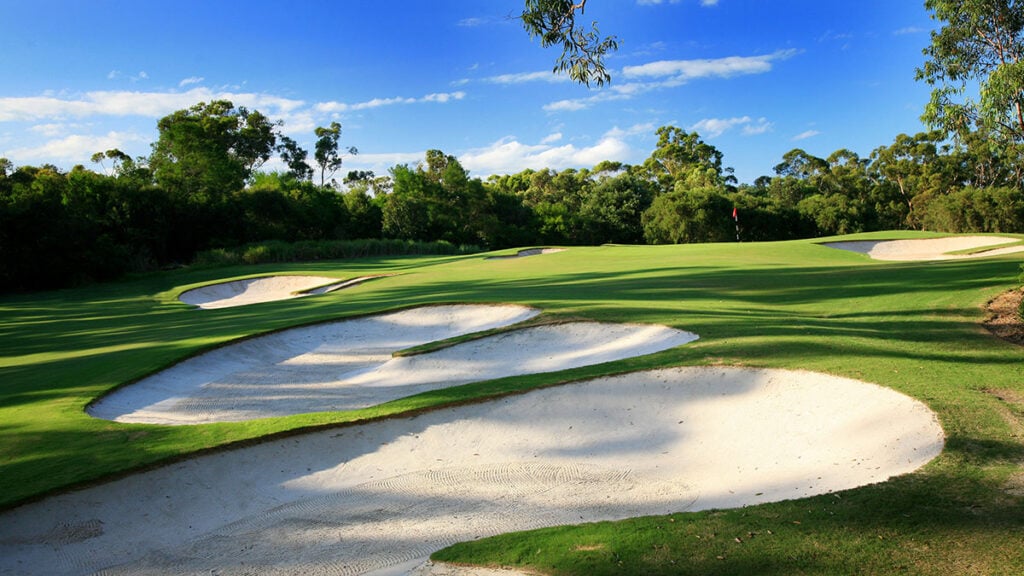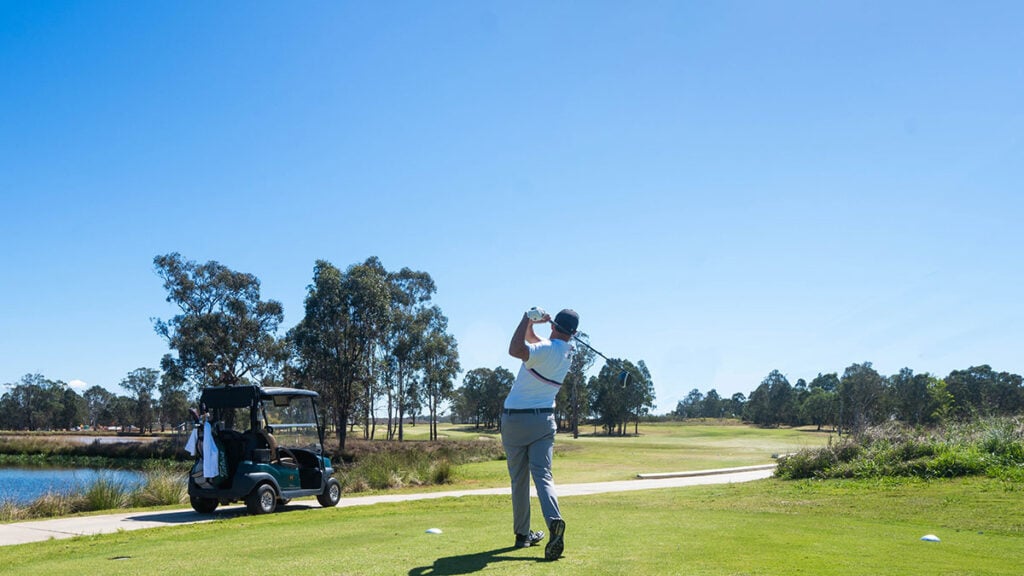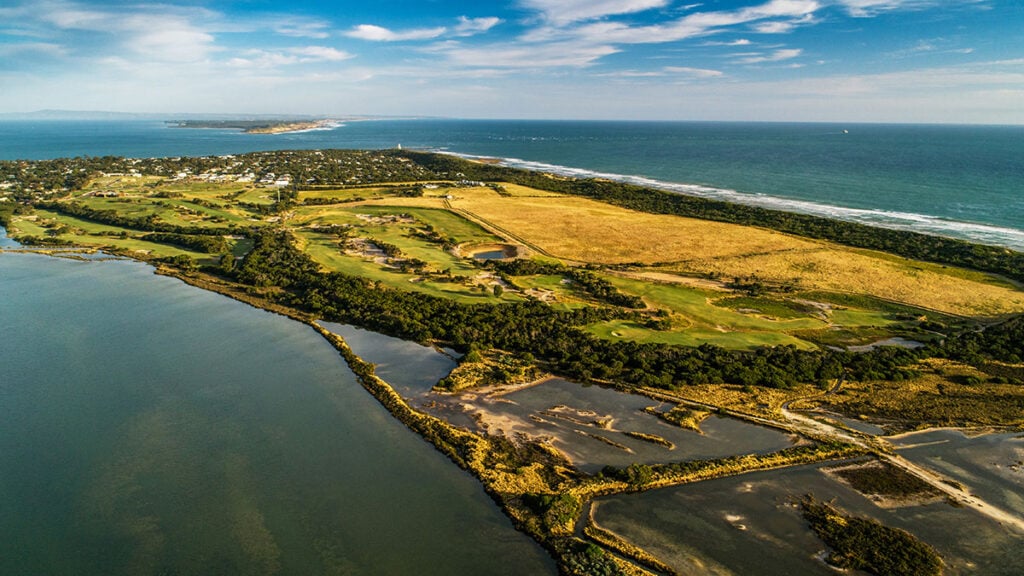Mixing a successful career and golf is tough, even more so when you’re also seeking to help the game’s next generation
Bonnie Boezeman
Home club: Killara GC, Sydney
Handicap: 19
How did you get into golf and at what age?
I played several sports since the age of 4 but due to family circumstances, I could not play sports that cost money until I started working (which I did at 10 years old by mowing lawns and painting garages, etc.). I always thought golf was for lazy, affluent, unfit men. So I picked it up when I was 40! As the managing director/chair of a subsidiary of a multinational US corporation (my territory was the South Pacific), I used to meet the MDs of other countries once every six months. We had a meeting in Gleneagles, Scotland, and I got the bug.
▶ ▶ ▶
You are originally from America. How different was life in America versus Australia?
I was born and raised in upstate New York and never played golf in the USA, because I left with my guitar and backpack as a hippy and flew to the UK and eventually Europe by myself in 1972. I was a war protester – against sending troops to Vietnam, didn’t like the US gun situation and materialistic expectations in America. I never went back to live in the past 50 years and became an Australian 30 years ago. The happiest day of my life!
▶ ▶ ▶
You have played Augusta National. How was that experience?
I have had two bucket-list wishes, firstly to play Augusta and secondly to go to the Ryder Cup in Europe. I was chosen in 1987 by my employer, Time Life Inc., to attend the Harvard Business School executive program, which was four months at Harvard, six days a week at school. One of my classmates was a mad keen golfer from Johannesburg, and another French classmate’s fiancé was a famous French golf pro. I had not taken up golf yet, so they urged me to after we graduated. A few years later, my South African friend, Jacko, told me he was chosen by Augusta to take over the membership of an older gentleman who Jacko used to caddie for at Augusta. There are only 303 members at Augusta, and only one from Australia and one from South Africa – mainly they are all Americans. The strict rule is you cannot play Augusta unless you are invited by a member and they remain with you the entire time.
I organised our 30th class reunion in 2018 at Harvard and Jacko said the course was re-opening the day after our reunion in Boston was over. The rule is a member can invite only three guests at a time. So, it was Jacko, his wife, another of my Harvard classmates and myself. We stayed at the famous Butler Cabin, where they present the green jacket, and for three days we played 45 holes. I have several wonderful photos. Thought I went to golf heaven, it was so amazing. I have many stories I could share from this extraordinary experience. Then later in 2018, a famous lady pro from Paris who is vice-president of the French PGA invited me to stay with her when the Ryder Cup was played in Paris. I lived and worked in Paris for Time Life in 1981, and I am totally supportive of Europe to win the cup, so we partied really hard when they won!
▶ ▶ ▶
You are on the board of the Australian Golf Foundation and are creating some incredible opportunities for young girls to play the game. Tell us about the foundation?
I joined the Australian Golf Foundation board nearly two years ago. It was a new foundation, with no money and no specific project at that stage. I did a proposal to the board in 2020 to launch a junior girls scholarship program that mirrors the program I started at Killara Golf Club in 2019. I raised enough money to launch and pay for 226 girls from 37 clubs across the country. We are finalising the 2022 intake, and it will most probably settle at nearly 800 girls from 135 clubs. There is a desperate need for young girls to come into the game. The average age of female golfers in Australia is nearly 64. The age group for the junior program is 10 to 16 years. The satisfaction rating for the first-year program is 80 to 90 percent good or brilliant – numbers never seen before in golf!
▶ ▶ ▶
You have won many awards, including a Papal Knighthood, Officer in the Order of Australia and the Centenary Medal by the Prime Minister of Australia and you have been on 14 boards and managing director at several international companies. What has been the driving force over the course of your career?
My passion for people. If you care about the people you work with – motivate them, compliment and inspire them – you can move mountains in any company or sporting endeavour. I am pleased to say I have seen mountains moved, and reaching the summit made so many people so proud, happy and fulfilled.
▶ ▶ ▶
What words of wisdom would you give a young Australian woman wishing to have a career in your footsteps?
My advice to young women wishing to achieve success is to be true to yourself, care about others and make a point to know the business you are in. I treated Time Life and Time Warner as if it was a university and I had to study all aspects of the business (I do exactly that same procedure with new boards I join). Knowledge is power. I also urge people when I mentor them to inspire their staff reporting to them, even if it is one employee. Show respect to others, persevere and find an independent mentor.
▶ ▶ ▶
You are an outstanding businesswoman, with a CV as long as your arm. What do you attribute your success to, and did you envisage this career?
I always say: success is a state of mind. A woman can be successful as a mum, a gardener or making the world a better place. I consider myself lucky that when I was younger, I worked with and taught emotionally disturbed children at a childcare institute and studied several books on psychology. Unknowingly, I learned the art of inspiring and motivating people. We always had a great work atmosphere and people loved to come in to work. If you spend the majority of your life with work colleagues (at least before the pandemic), then it is everyone’s responsibility to make each day enjoyable and fun.
▶ ▶ ▶
What do you deem to be the most successful part of your career to date?
There are defining moments in every life. My first was leaving the US by myself and exploring the world, especially countries all over Europe. And the more knowledge you gain, the better you can share that with others. Some moments over the years I am most proud of are: publishing for Time Life the award-winning, 16-book series, Australians At War, marching in the opening/closing ceremony of the 2000 Olympics as an attaché for the Surinam team, organising Barangaroo for the opening ceremony of World Youth Day and the Pope’s visit, as executive producer of the official World Youth Day song with Guy Sebastian and Paulini, and producing a song for St Mary Mackillop’s canonisation in Rome in 2010. The launch of the 2020 AGF Junior Girls Scholarship program is really up there, too! These are just a few highlights of a blessed career.
▶ ▶ ▶
You have attended some of the top universities in the United States. Would you advise young aspiring golfers to prioritise their education?
I really do support aspiring golfers to try to get a US scholarship. I have spent time mentoring Issy Taylor, a stunning girl and golfer from Sanctuary Cove who is attending Oregon State University. Within two years she became an All-American, which is very difficult to achieve. One of my close friends is Mhairi McKay from Scotland, who won the Australian Open in 2003 and was one of the first to get an international scholarship from Stanford University. I went to her Hall of Fame presentation at Stanford in 2012 – the first female international golf member to receive this award and she was in a team briefly with Tiger Woods when he was
at the same school. At uni, you learn life skills as well
as playing golf with some
of the best future golfers in the world.
▶ ▶ ▶
With everything you do, how do you find time to play golf?
Yes, finding time over the years – running a company and then moving onto multiple boards – has been challenging. But if I did have a board meeting on ladies day at Killara, I would just have to miss out. I have tried to play twice a week and it is wonderful. I love to take the junior girls out for competition at Killara on Sundays.
▶ ▶ ▶
Is there anything you would change in your life?
I wouldn’t change a thing in my past. The only thing I still miss is not having the possibility of having children after being married for a long time.
▶ ▶ ▶
What is your best tip you’d give women to inspire them to be the best they can be, on or off the golf course?
Believe in yourself and love one another.




